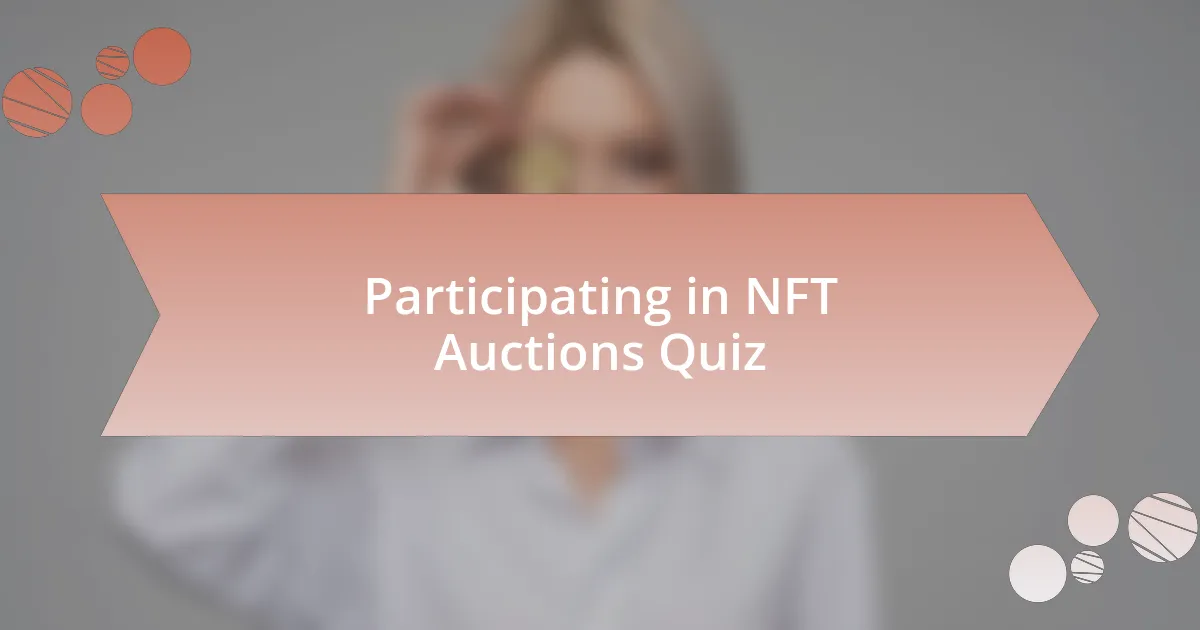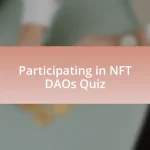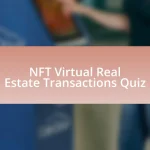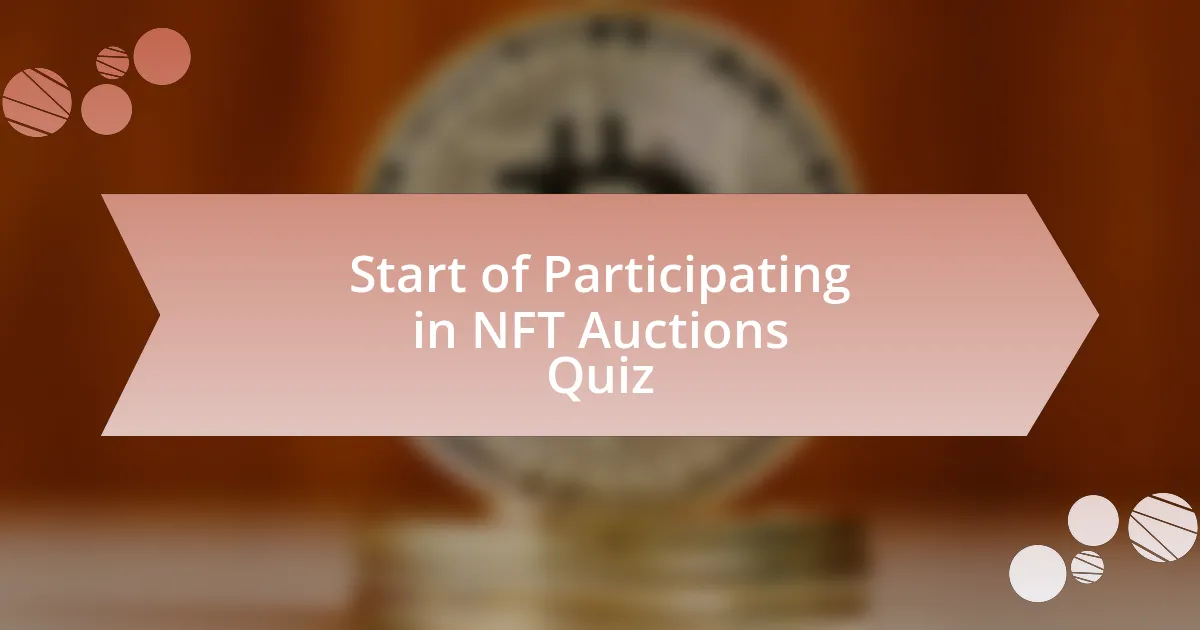
Start of Participating in NFT Auctions Quiz
1. What is an NFT auction?
- An NFT auction is a giveaway event where NFTs are distributed freely to random users.
- An NFT auction is a fixed-price sale where buyers pay a set amount to buy the NFT directly without bidding.
- An NFT auction is a sale process where owners or developers list specifically non-fungible tokens for sale to interested buyers, allowing buyers to place bids according to the price they want to pay.
- An NFT auction is a raffle where buyers win a chance to purchase unique digital assets at no cost.
2. How do NFT auctions work?
- In an NFT auction, buyers must accept the seller`s price immediately without any bidding process or offers allowed.
- NFT auctions involve sellers directly selling their NFTs at fixed prices to interested buyers without any bidding.
- In an NFT auction, buyers place bids on the NFT, and the auction ends with the highest bidder winning the NFT. The auction can be open or closed, and it may include a reserve price.
- NFT auctions work by randomly selecting a buyer to receive the NFT, regardless of any bids or offers made.
3. What is the reserve price in an NFT auction?
- The reserve price is a fixed price that cannot be changed after listing.
- The reserve price is the minimum ETH sellers are willing to accept for their NFT.
- The reserve price is the maximum ETH buyers can offer at the start.
- The reserve price is the service fee deducted from the final auction sale.
4. What happens if the reserve price is met in an NFT auction?
- Buyers can increase their bids endlessly.
- The seller cancels the auction entirely.
- The platform starts a 24-hour countdown.
- The auction automatically ends immediately.
5. What types of NFT auctions exist?
- There are public and private NFT auctions.
- There are silent and loud NFT auctions.
- There are casual and formal NFT auctions.
- There are open and closed NFT auctions.
6. How do buyers place bids in an NFT auction?
- Buyers place bids by posting their amount on social media for public votes.
- Buyers place bids by making a phone call to the seller and discussing the offer.
- Buyers place bids by specifying an amount higher than the existing bid and clicking the ‘Place Bid’ option.
- Buyers place bids by sending an email to the auction house with their proposed price.
7. What information do buyers need to view during an NFT auction?
- Details of the existing bid and time remaining
- Total number of bidders and seller feedback
- Seller`s historical sales performance and NFT rarity
- Price trends of cryptocurrencies and NFT marketplaces
8. What is the purpose of a 15% service fee in NFT auctions?
- The 15% service fee is a tax imposed by the government on NFT sales.
- The 15% service fee is used to cover the costs of creating new NFTs for the auction.
- The 15% service fee is added to the final NFT selling price and is important for setting up the reserve price.
- The 15% service fee compensates the authors for their artistic contributions to the NFT.
9. How do sellers list NFTs for auction?
- Sellers can list their NFTs for auction by signing up for an NFT marketplace, connecting their wallet, and choosing the ‘List your NFT’ option.
- Sellers must find an independent broker to list their NFTs on an external website.
- Sellers can only list NFTs by directly contacting potential buyers through social media.
- Sellers are required to convert their NFTs to a stablecoin before listing for auction on platforms.
10. What is the role of Etherscan in monitoring NFT transactions?
- Etherscan facilitates direct NFT purchases by connecting buyers with sellers on various platforms.
- Etherscan offers a dedicated wallet service for storing and trading NFTs in one place.
- Etherscan tracks NFT transactions on the Ethereum blockchain, providing real-time information to users.
- Etherscan manages user accounts for NFT marketplaces, enabling secure logins and transfers.
11. What are the common platforms used for NFT auctions?
- Opensea
- eBay
- Amazon
- Craigslist
12. How do buyers ensure they have enough cryptocurrency for an NFT purchase?
- Buyers invest in stocks to fund their NFT purchases.
- Buyers use bank loans to acquire cryptocurrency for NFTs.
- Buyers ensure they have enough cryptocurrency to cover the NFT price and gas fees.
- Buyers must trade commodities before purchasing an NFT.
13. What is a timed auction in NFTs?
- A timed auction is a sale where the auction ends immediately when a buyer places a bid.
- A timed auction allows sellers to set a price that gradually increases until someone bids.
- A timed auction is a type of English auction where buyers make an offer or submit a bid, and the auction closes after a set period unless there are last-minute bids.
- A timed auction is a method where buyers purchase NFTs directly at a fixed price without bidding.
14. What is a Dutch auction in NFTs?
- A Dutch auction is a fixed-price sale where buyers purchase NFTs at a set price.
- A Dutch auction involves the seller setting a start price that decreases at intervals until a buyer bids.
- A Dutch auction occurs when bidders raise the price until only the highest bidder remains.
- A Dutch auction allows buyers to set their starting bids at any price they choose.
15. How do smart contracts facilitate NFT auctions?
- Smart contracts ensure that only the original creators can bid on the NFTs.
- Smart contracts allow sellers to manually control every aspect of the auction process.
- Smart contracts require bidders to meet in person to place their bids during the auction.
- Smart contracts specify the accepted payment type, minimum price, buy now price, auction bid period, and fees percentage.
16. What happens during the minting process of an NFT?
- Minting processes create the NFT`s unique token ID on the blockchain.
- Minting processes print physical copies of NFTs for collectors.
- Minting processes involve selling NFTs directly to buyers without an auction.
- Minting processes destroy existing NFTs to create new ones.
17. How do creators initialize an NFT auction?
- Creators announce the auction on social media before initiating it.
- Creators invoke the start function on the auction smart contract to set the start price.
- Creators submit a detailed document to the platform specifying the auction terms.
- Creators list their NFTs for sale on a public forum to attract bidders.
18. What is the process of placing bids in an NFT auction?
- Buyers place bids by posting comments on social media about how much they are willing to pay.
- Buyers place bids via telephone calls to the auction house to negotiate prices.
- Buyers place bids by sending emails to the auctioneer expressing their interest.
- Buyers place bids by connecting their wallet and submitting a transaction indicating their bid amount.
19. What happens when the auction time expires or the seller manually ends it?
- The seller keeps the NFT without payment.
- The auction continues indefinitely.
- The highest bidder is declared the winner.
- All bidders receive the NFT equally.
20. How are the proceeds of an NFT auction distributed?
- All proceeds go directly to the buyer, and sellers receive nothing from the auction.
- Proceeds are held in escrow and released only if the buyer makes a payment.
- Sellers receive a fixed amount regardless of the final auction price.
- The proceeds are split between the seller and any relevant parties, such as platforms hosting the auction or providing tools, who take a percentage as fees.
21. What platforms are popular for hosting NFT auctions?
- Spotify
- Opensea
22. How do buyers ensure fairness and transparency in NFT auctions?
- Buyers can only bid with higher amounts than the starting price.
- Buyers check the platform`s rules and verify the seller`s identity.
- Buyers just follow the auction time without checking any details.
- Buyers see the NFT list before participating in the auction.
23. What is the role of a whitelist in an NFT auction?
- A whitelist allows any user to place bids without restrictions in an NFT auction.
- A whitelist is used to set a minimum price for bidding on NFTs in an auction.
- A whitelist determines the length of time an auction will run before closing.
- A whitelist restricts participation to a specific group of users, ensuring that only invited or approved bidders can participate in the auction.
24. How do sellers set the start and end times for an NFT auction?
- Sellers set the start and end times for the auction, which can be more than a day, and can extend or shorten the time based on demand and marketing strategies.
- Sellers select fixed times for auctions that cannot be adjusted under any circumstances.
- Sellers determine the start and end dates based on personal schedules without platform rules.
- Sellers must rely on buyers to agree on start and end times for the auction.
25. What happens at the final call of an NFT auction?
- All bidders are refunded their bids, and the NFT goes unsold.
- The bidding closes, the list of bidders appears, and the highest bidder is set to transfer the NFT directly after the proceeding protocol.
- The platform conducts a random draw to determine the winner of the NFT.
- The auction restarts for an additional hour, allowing more bids to come in.
26. How do buyers receive their NFT after winning an auction?
- The buyer receives the NFT in their wallet address after payment is made to the smart contract.
- The buyer downloads the NFT directly to their computer as a file.
- The buyer receives a link via email to access the NFT.
- The buyer is sent a physical certificate of ownership in the mail.
27. What is the significance of sufficient fiat or crypto in NFT auctions?
- Bidders need to have multiple NFTs to participate in the auction effectively.
- Bidders must pay a fee equal to the NFT price to initiate a bid.
- Bidders are required to provide additional personal information before placing any bids.
- Bidders must have sufficient fiat or crypto to claim their bid, as insufficient funds can lead to failed transactions.
28. How do NFT marketplaces handle transactions and fees?
- NFT marketplaces handle transactions by converting all bids to fiat currency and charging a single service fee upon completion.
- NFT marketplaces handle transactions and fees by charging a percentage of the sale price and ensuring that buyers have enough cryptocurrency to cover the NFT price and gas fees.
- NFT marketplaces only take a percentage from the sellers, and buyers do not need to worry about any fees or cryptocurrency balance.
- NFT marketplaces charge a flat fee for all transactions regardless of the sale price and do not require any cryptocurrency.
29. What are the common types of NFT listings?
- Fixed-price and auction listings
- Casual and formal listings
- Monthly and weekly listings
- Public and private listings
30. How do buyers determine the price of an NFT in an auction?
- Buyers only increase their bid based on the number of items available in the auction.
- Buyers choose a price based on the seller`s preferences before placing a bid.
- Buyers set their own fixed price without bidding against others in the auction.
- Buyers determine the price by outbidding the highest bidder or participating in a Dutch auction where the price decreases over time.
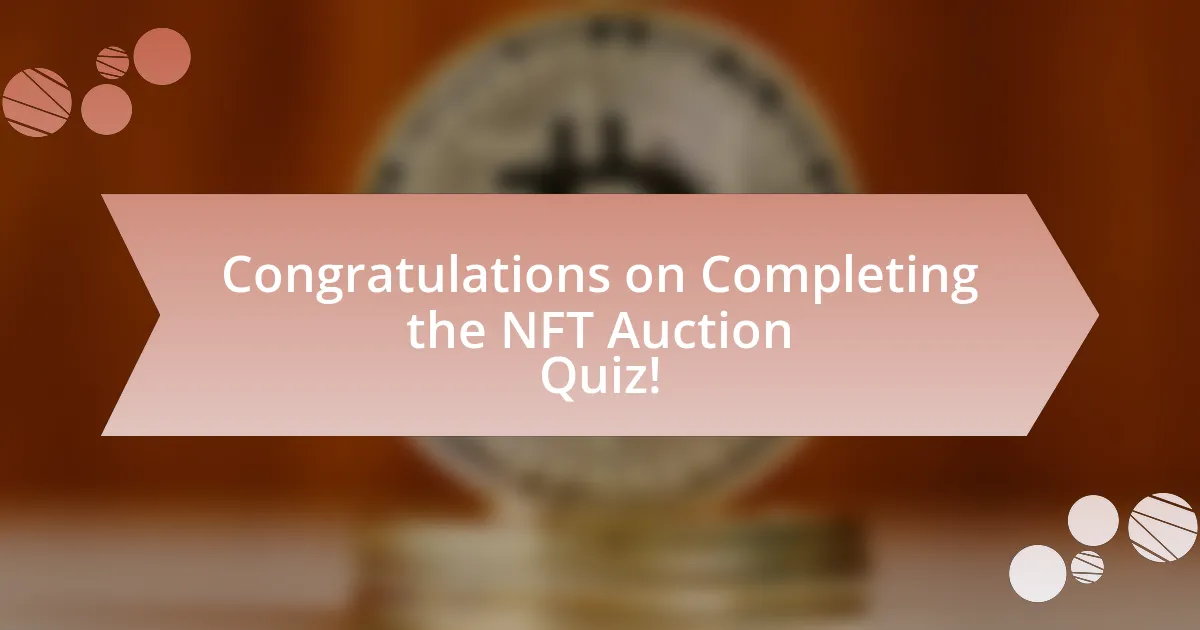
Congratulations on Completing the NFT Auction Quiz!
We hope you enjoyed the quiz on participating in NFT auctions. This interactive experience not only tested your knowledge but also provided insights into the fascinating world of NFTs. You may have learned about the key strategies for bidding, the importance of research, and the factors that influence auction prices. Each question was designed to deepen your understanding and spark your interest.
Engaging with this material is a step toward becoming an informed participant in the NFT space. Understanding auction mechanics may empower you to make better decisions in your future buys. The knowledge you’ve gained can help you navigate this evolving marketplace with confidence. Remember, staying informed is crucial in any investment strategy.
To further enhance your knowledge, we invite you to explore the next section on this page. It offers more in-depth information about participating in NFT auctions, including tips for successful bidding and insights from experienced collectors. Dive deeper and enrich your understanding as you embark on your NFT journey!
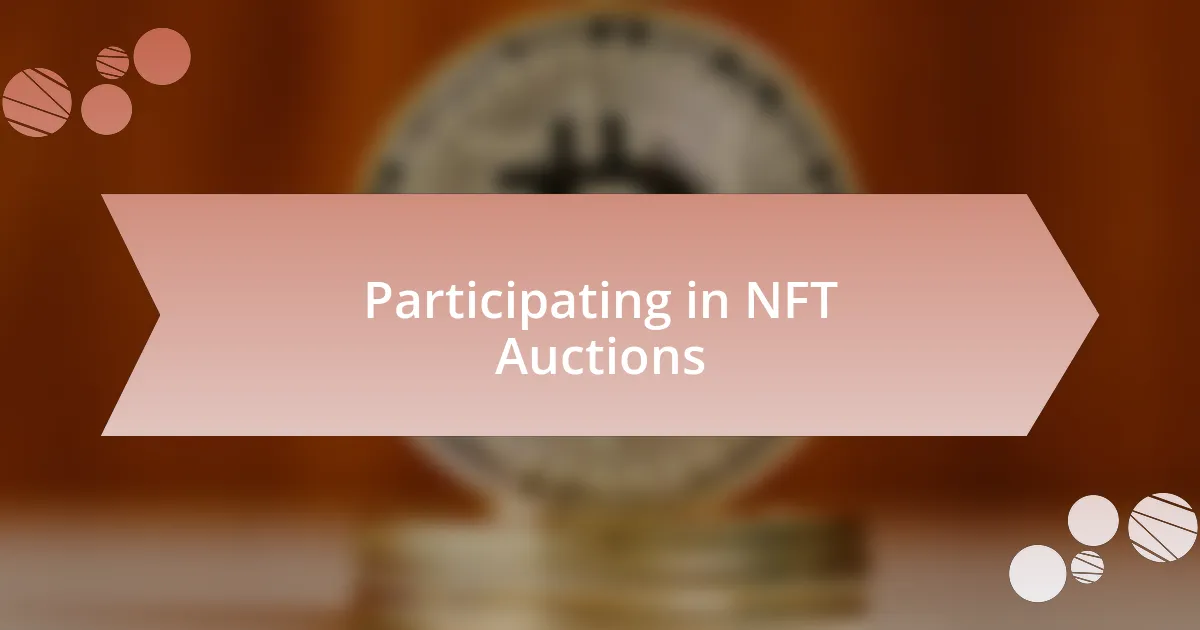
Participating in NFT Auctions
Understanding NFT Auctions
NFT auctions are platforms where non-fungible tokens are sold to the highest bidder. These auctions can be conducted in real-time or in a fixed duration format. They leverage blockchain technology to ensure the authenticity and ownership of digital assets. The auction process typically involves bidding, where participants place competitive offers. This creates a transparent environment, as all bids are recorded on the blockchain, ensuring a fair auction process. NFT auctions have emerged as a significant market, reflecting the growing importance of digital collectibles and artworks.
Types of NFT Auctions
There are primarily two types of NFT auctions: English auctions and Dutch auctions. In an English auction, bidders place increasingly higher bids until no one is willing to bid further. The highest bid wins the NFT. In contrast, a Dutch auction starts with a high price that decreases until a bidder accepts the current price. Each type has its dynamics, impacting bidder strategies and final sale prices. Knowledge of these formats is crucial for effective participation in NFT auctions.
Preparing to Participate in NFT Auctions
Preparation for participating in NFT auctions involves several key steps. First, one must choose a reliable NFT marketplace that supports auctions. Common platforms include OpenSea and Rarible. Next, participants should create a digital wallet to store crypto assets and NFTs. Familiarizing oneself with the auction rules and the specific NFT’s details is essential. Researching previous auction outcomes can provide insights into bidding strategies. Proper preparation can enhance the chances of successful participation.
Strategies for Bidding in NFT Auctions
Effective bidding strategies in NFT auctions are vital for success. Participants should establish a budget to avoid overspending. Using competitive bidding tactics, like bidding incrementally, can be advantageous. Observing bidding patterns and considering the auction’s end time can inform better decisions. Patience is crucial; bidding too early may drive prices up unnecessarily. Understanding the perceived value of the NFT can also guide appropriate bidding. These strategies can lead to optimal outcomes during auctions.
Post-Auction Steps after Winning an NFT
After winning an NFT auction, several important steps must follow. First, the transaction must be confirmed and the NFT transferred to the winner’s wallet. Reviewing the ownership transfer and related transaction fees is necessary. Additionally, the winner should consider the long-term value of the NFT. This may involve insurance or further investment strategies. Engaging with communities related to the NFT can also enhance value appreciation. These steps ensure that the post-auction experience is smooth and informed.
What are NFT auctions?
NFT auctions are platforms or events where non-fungible tokens (NFTs) are sold to the highest bidder. These auctions can operate on various blockchain marketplaces like OpenSea or Rarible. The process typically involves listing an NFT with a starting bid, and participants place bids until the auction ends, selling the NFT to the highest bidder at that time.
How do I participate in an NFT auction?
To participate in an NFT auction, you need a digital wallet that supports cryptocurrencies. First, fund your wallet with the required cryptocurrency, usually Ethereum. Next, connect your wallet to an NFT marketplace, locate the auction you wish to enter, and place your bid before the auction closes. Ensure you understand the auction rules and fees associated with bidding.
Where can I find NFT auctions?
NFT auctions can be found on various online marketplaces specifically designed for digital assets. Popular platforms include OpenSea, Rarible, Foundation, and SuperRare. These websites list ongoing and upcoming auctions, allowing users to browse, participate, and discover a variety of NFTs available for bidding.
When do NFT auctions take place?
NFT auctions take place at varying times depending on the platform and the artist’s schedule. Many platforms host continuous auctions, while others may have fixed start and end dates for specific items. Participation is often time-sensitive, so it’s crucial to check the auction duration listed on the marketplace.
Who can participate in NFT auctions?
Anyone can participate in NFT auctions, provided they have a digital wallet and the necessary cryptocurrency to place bids. There are usually no restrictions based on location or status, making it accessible to a global audience. However, some platforms may have specific rules regarding account verification or participation eligibility.

